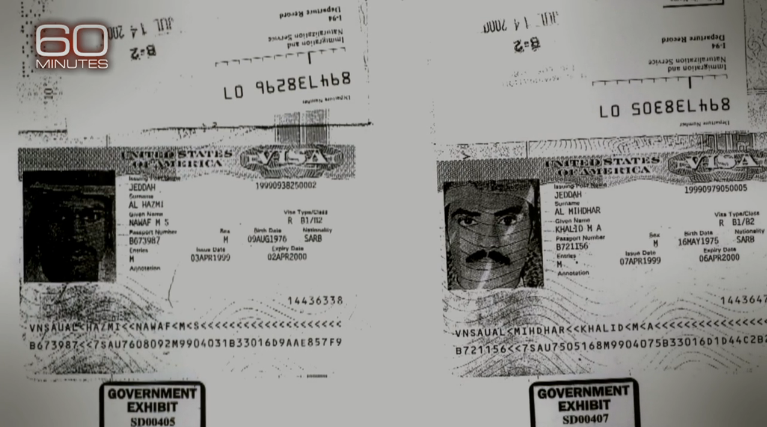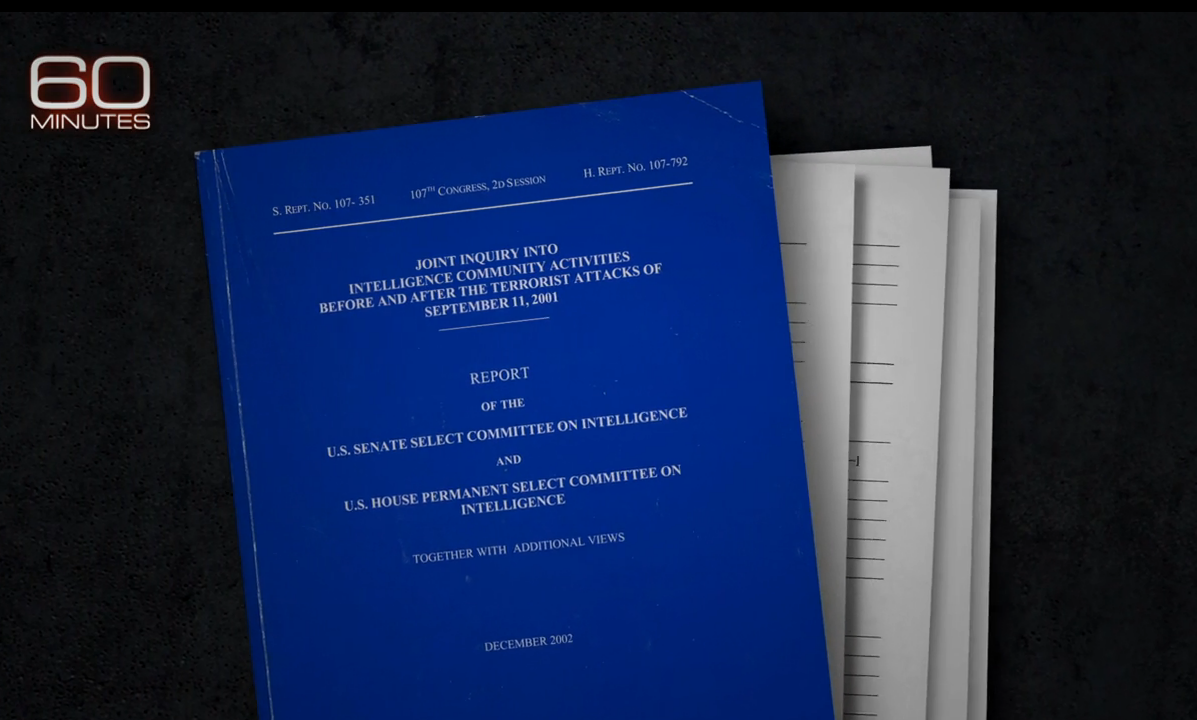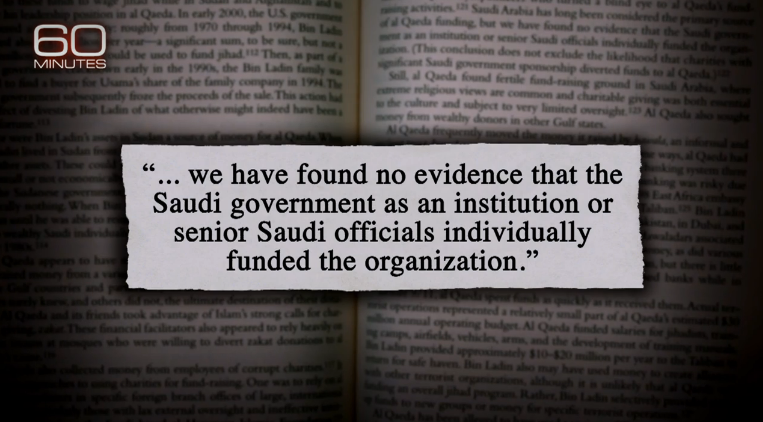Last night’s report by CBS’s 60 Minutes with correspondent Steve Kroft covered the controversial classified pages of the Joint Inquiry Into Intelligence Community Activities Before and After the Terrorist Attacks of September 11, 2001 report produced by U.S. Senate Select Committee on Intelligence and the U.S. House Permanent Select Committee on Intelligence in December 2002.
This report preceded what is known as The 9/11 Commission Report (Final Report of the National Commission on Terrorist Attacks Upon the United States) produced by The National Commission on Terrorist Attacks Upon the United States issued July 22, 2004.
Kroft interviews several government officials and members of congress who have read the report, including former Senator Bob Graham (D-Florida). Graham said the network that helped implement the 9/11 attacks was supported in the United States with “substantial” backing from Saudi Arabia. When asked by correspondent Steve Kroft whether that means the Saudi government, wealthy people in Saudi Arabia, and/or charities, Graham responded “all of the above.”
Graham has been trying to get 28 pages of the 9/11 report released to the public. Those pages were redacted on national security grounds by the George W. Bush administration, and remain classified under the Obama administration.
Former CIA director Porter Goss has also advocated for an uncensored version of the full 9/11 commission report’s findings to be released to the public, including the final chapter that is currently classified.
What you need to know about the 60 Minutes Report
Kroft says that Goss, Graham, and others have described the 28 pages as “a working draft, similar to a grand jury or police report, that includes provocative evidence – some verified and some not. They lay out the possibility of official Saudi assistance for two of the hijackers who settled in Sothern California.”
The concern specifically surrounds two Saudis that arrived in Los Angeles with limited language skills and no previous exposure to western culture. They arrived after attending an Al-Qaeda summit in Kuala Lampour. The two Saudis, Nawaf Al-Hazmi and Khalid Al-Mihdhar, were issued passports in Jeddah. Despite their limitations, they were able to get housing and flight lessons.
During their first days in Los Angeles, Al-Hazmi and Al-Mihdhar met with an official from the Saudi consulate in Los Angeles named Fahad Al-Thumairy. Al-Thumairy was known to have extremist views, and was in regular contact with another Saudi, named Omar al-Bayoumi, who was reportedly the two hijacker’s “biggest benefactor,” with a “no-show job” with a Saudi aviation contractor and reportedly received a paycheck from the Saudi government.

Two Saudi hijackers’ allegedly received support while in the United States. Screenshot via CBS: 60 minutes.
Graham has accused Al-Bayoumi of being an agent of Saudi Arabia. According to the report, after visiting Al-Thumairy at the Saudi consulate in Los Angeles, Bayoumi encountered Al-Hazmi and Al-Mihdhar “by coincidence” at a restaurant across the street from the consulate on Venice boulevard. From there, Al-Bayoumi helps the two hijackers move to San Diego, co-signing a lease for an apartment for them in his building and advanced them the security deposit, and even threw them a “party” where they were introduced to others.
The day that Al-Bayoumi helped Al-Hazmi and Al-Mihdhar move to San Diego, he allegedly made four phone calls to Anwar Al-Awaliki, who was the imam at a San Diego mosque and eventual Al-Qaeda spokesperson who was eventually killed by the United States in Yemen.
Al-Thumairy had his A-2 visa revoked by the Department of Homeland Security and was denied re-entry into the United States in 2003.
Questions Remain
Kroft and 60 Minutes did not interview a Saudi official for this report and the Royal Embassy of Saudi Arabia in Washington released a statement in reaction to the 60-minutes documentary after the segment had been aired. The embassy pointed to the fact that Saudi Arabia has repeatedly been sued unsuccessfully for the 9/11 attacks; “The court findings were based on the sheer absence of any substantive claims against Saudi Arabia, plain and simple.”
The 60 Minutes segment included brief footage of the embassy in Washington, but presented only one side of this story.
It is not clear the 28 classified pages amount to a “slam dunk” or even “smoking gun” of official Saudi involvement. The circumstances described in the 9/11 report by the participants in the 60 Minutes interview point to possible involvement by very low-level Saudi officials, namely, Al-Thumairy from the consulate and Al-Bayoumi, who may have been operating as an agent of Saudi Arabia. There is no credible evidence available that either were acting on orders from any other Saudi government officials.
It is also possible that the fact that the 28 page section has been classified in part because it is sort of “working draft” with parallels to a grand jury indictment, with varying claims based on truth or speculation. The Embassy statement described the 60 Minutes program as, “compilation of myths and erroneous charges that have been thoroughly addressed not just by the Saudi government but also by the 9-11 Commission and the U.S. courts.”
The Royal Embassy statement also distinguished between the House/Senate report and what is known as the ‘The 9/11 Commission.’ “The 9-11 Commission long ago put to rest these false accusations, which have caused fear of and cast doubt over Saudi Arabia. The 9-11 Commission confirmed that there is no evidence that the government of Saudi Arabia supported or funded Al-Qaeda.”
A Losing Streak in American Media
The 60 Minutes report is more negative publicity for Saudi Arabia on prime time television in recent weeks.
A recent PBS Frontline documentary, “Saudi Arabia: Uncovered,” highlighted a part of Saudi Arabia that is “rarely seen” with hidden-camera footage that casts a negative light on Saudi Arabia.
According to Gallup, Saudi Arabia has a 55% “unfavorable” view among all Americans in a poll that was released in February, before these two documentaries aired.










